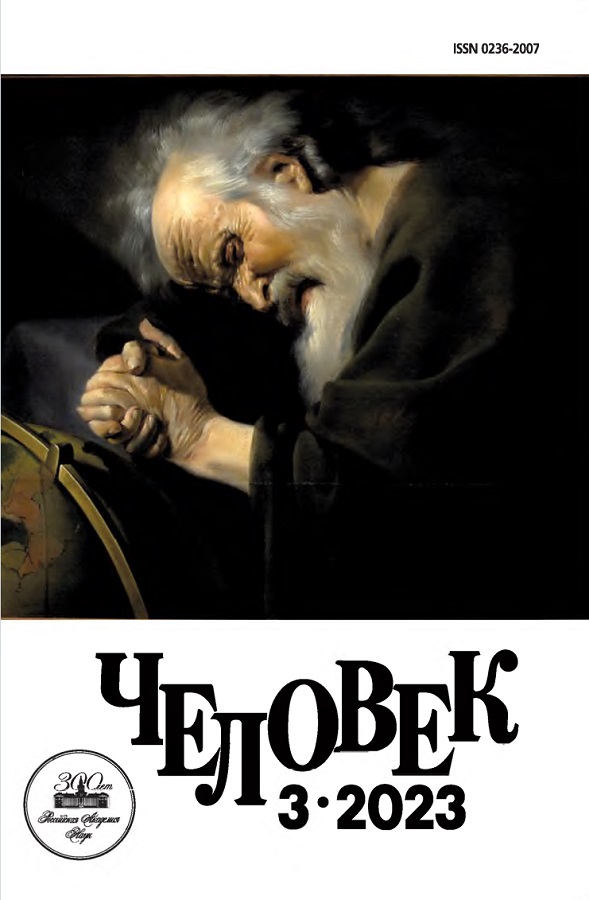Existential Problems of the Philosophy of Nursing J. Travelby and K. Martinsen in the Perspective of Palliative Care
- Authors: Chasovskih G.A.1
-
Affiliations:
- Pirogov Russian National Research Medical University
- Issue: Vol 34, No 3 (2023)
- Pages: 111-128
- Section: Social practices
- URL: https://ruspoj.com/0236-2007/article/view/670699
- DOI: https://doi.org/10.31857/S023620070026108-5
- ID: 670699
Cite item
Abstract
This article examines the philosophical theories of nursing by J. Travelby and K. Martinsen. The central object of research is some ways in which both theories explain the existential problems in the medical practice, using the example of the search for existential values, experience of illness, the proximity of death and care. This article also discusses the philosophical foundation of both theories, their advantages and disadvantages, and limitations of application. Travelby's theory of interpersonal relationships is one of the first attempts to integrate philosophical language into nursing. This synthesis can be called successful, but not profound. The main goal of nursing is the search for meaning. K. Martinsen, on the contrary, achieved success in the depth of this philosophical synthesis, but it made this theory more difficult. Inspired by the philosophy of Heidegger, Martinsen chose care as the central concept of her theory. Particular attention in the text is given to the possibility of extrapolating these models to the theory and practice of palliative care for adults and children. The analysis allows us to conclude that the application of the philosophical theories of Travelby and Martinsen can be of value for palliative care, both in a descriptive and exploratory way, and as a model for teaching in specialist-patient interaction.
About the authors
Grigoriy A. Chasovskih
Pirogov Russian National Research Medical University1b Ostrovitianov str., Moscow 117997, Russian Federation
References
- Азбука паллиативной помощи детям / под ред. Н.Н. Саввы. М.: Изд-во «Проспект», 2020.
- Киркеволд М. Сестринское дело. Анализ и оценка теорий / пер. с норвежского Э. Панкратовой. М.: ПЕР СЭ, 2000.
- Мирошниченко М.Д. Жизнь, не принадлежащая себе: триада «ребенок — родитель — врач» и феноменология в паллиативной помощи детям // Социологическое обозрение. 2021. Т. 20, № 3. С. 182–214.
- Ноздрачев Д.И., Замятин К.А., Мирошниченко М.Д. Моральный дистресс в паллиативной помощи детям: классические проблемы и вызовы пандемии COVID-19 // Человек. 2022. Т. 33, №. 3. С. 138–158.
- Основы паллиативной помощи / под ред. Р. Твайкросса, Э. Уилкока; пер. с англ. В.В. Ерохиной, Г.Ш. Юнусовой. М.: Благотворительный фонд помощи хосписам «Вера», 2020.
- Франкл В. Человек в поисках смысла: пер. с англ. и нем. / общ. ред. Л.Я. Гозмана, Д.А. Леонтьева. М.: Прогресс, 1990.
- Хайдеггер М. Бытие и время / пер. с нем. и примеч. В.В. Бибихина. М.: Ad Marginem, 1997.
- Хайдеггер М. Письмо о гуманизме // Хайдеггер М. Время и бытие / пер. с нем. В.В. Бибихина. М.: Республика, 1993. С. 192–220.
- Alligood M.R. Nursing Theorists and Their Work. St. Louis, MO: Elsevier Health Sciences, 2017.
- Alvsvåg H. Kari Martinsen: Philosophy of caring. Nursing theorists and their work, ed. by M.R. Alligood. St. Louis, MO: Mosby Elsevier, 2014. P. 147–170.
- Alvsvåg H., Martinsen K.M. Omsorg og skjønn. Tidsskrift for omsorgsforskning. 2018. Vol. 4, N 3. P. 215–222.
- Berbiglia V.A., Banfield B., Dorothea E. Orem: Self-Care Deficit Theory of Nursing. Nursing theorists and their work, ed. by M.R. Alligood. St. Louis, MO: Mosby Elsevier, 2014. P. 240–257.
- Boge J., Martinsen K. Kritiske kommentarer til evidensbasert undervisning og praksis. Vård i Norden. 2006. Vol. 26, N 2. P. 32–35.
- Dobrina R., Tenze M., Palese A. An overview of hospice and palliative care nursing models and theories. International journal of palliative nursing. 2014. Vol. 20, N 2. P. 75–81.
- Ellingsen S. et al. The pendulum time of life: The experience of time, when living with severe incurable disease — a phenomenological and philosophical study. Medicine, Health Care and Philosophy. 2015. Vol. 18(2). P. 203–215.
- Eriksson K., Martinsen K. The hidden and forgotten evidence. Scandinavian Journal of Caring Sciences. 2012. Vol. 26, N 4. P. 625–626.
- Gysels M., Shipman C., Higginson I.J. Is the qualitative research interview an acceptable medium for research with palliative care patients and carers? BMC medical ethics. 2008. Vol. 9. doi: 10.1186/1472-6939-9-7
- Larkin P. Shaping new thinking in palliative nursing. International Journal of Palliative Nursing. 2007. Vol. 13, N 8. P. 364–364.
- Martinsen K. Fra Marx til Løgstrup. Om moral, samfunnskritikk og sanselighet i sykepleien. Oslo: Tano Forlag, 1993.
- Martinsen K. Omsorg, sykepleie og medisin: historisk-filosofiske essays. Oslo: Tano, 1989.
- Nursing and Midwifery. World Health Organization. 2023. URL: https://www.who.int/health-topics/nursing#tab=tab_1 (date of access: 03.02.2023).
- Øye C., Mekki T. The articulation of impressions An interview with Kari Martinsen. International Practice Development Journal. 2016. Vol. 6, N 1. P. 1–8.
- Parola V. et al. Travelbee’s Theory: Human-to-Human Relationship Model-its suitability for palliative nursing care. Revista de Enfermagem Referência. 2020. V Série, N 2. P. e20010. doi: 10.12707/RV20010
- Saunders C. The evolution of palliative care. Journal of the royal society of medicine. 2001. Vol. 94, N 9. P. 430–432.
- Saunders D.C. The philosophy of hospice. Loss and grief: A guide for human services practitioners, N. Thompson, J. Campling (eds.). London: Red Globe Press, 2002. P. 23–33.
- Schimmoeller E.M., Rothhaar T.W. Searching for Meaning with Victor Frankl and Walker Percy. Linacre Q. 2021. Vol. 88, N 1. P. 94–104.
- Travelbee J. To find meaning in illness. Nursing. 1972. Vol. 2, N 12. P. 6–8.
- Travelbee J. What do we mean by rapport? The American journal of nursing. 1963. Vol. 63. P. 70–72.
- Travelbee J. What's wrong with sympathy? The American journal of nursing. 1964. Vol. 64, N 1. P. 68–71.
- Voetmann S.S., Hvidt N.C., Viftrup D.T. Verbalizing spiritual needs in palliative care: a qualitative interview study on verbal and non-verbal communication in two Danish hospices. BMC Palliative Care. 2022. Vol. 21, N 1. doi: 10.1186/s12904-021-00886-0
Supplementary files











